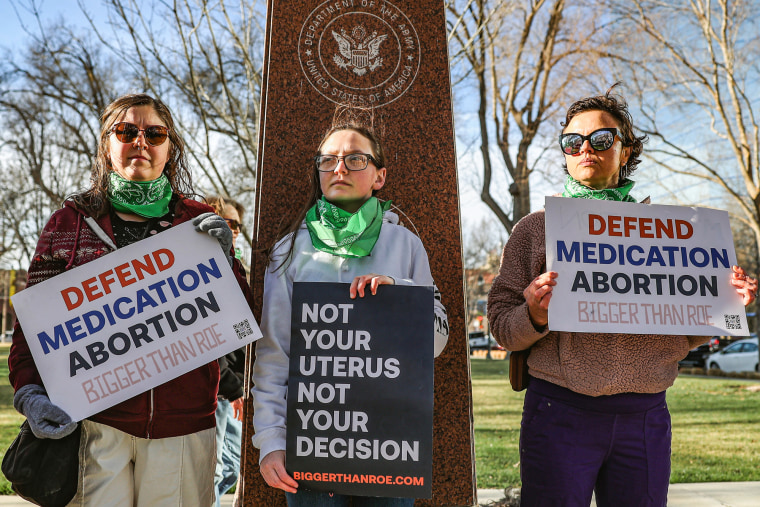About two years after the Supreme Court overturned Roe v. Wade, the court on Tuesday will revisit the issue of reproductive rights, this time contemplating whether to limit access to mifepristone, the first of two pills used in medication abortion.
Ahead of oral arguments and eventual ruling, doctors and patient advocates are expressing alarm about what might happen if the high court decides to tighten access to the drug.
Following the Dobbs ruling in 2022, 14 states now completely ban abortion, including medication abortion. A handful of other states ban delivering the drugs by mail and require patients to see a doctor in person before they can get a prescription for mifepristone. Medication abortions accounted for nearly two-thirds of all abortions in the United States in 2023, according to the Guttmacher Institute, a research group that supports access to abortion.
At issue Tuesday is whether the Food and Drug Administration disregarded important safety concerns when it expanded access to mifepristone beginning in 2016. Those eventual expansion include making it available from mail-order pharmacies.
Two studies cited in a Texas court ruling last year claimed mifepristone could be harmful. Those studies, however, were later retracted after the publication found “fundamental problems with the study design and methodology” as well as conflicts of interest.
“I’m very concerned,” said Dr. Kristyn Brandi, an OB-GYN in New Jersey and the former board chair for Physicians of Reproductive Health, an advocacy group for reproductive rights. “While there are alternatives that people could get if mifepristone is no longer available, it still means that most people seeking abortion are going to be impacted.”
It could set “an incredibly dangerous precedent,” said Kristen Moore, the director of the Expanding Medication Abortion Access Project. Putting the medication back “under lock and key” means “breaking the system,” she added.
The FDA first approved mifepristone in 2000 to end pregnancies of up to seven weeks.
Over the last decade, the FDA made revisions to the approval that made the drug easier to get, including allowing it to be prescribed without an in-person doctor visit and expanding the number of eligible pharmacies — such as drug store chains, including CVS and Walgreens — that can dispense the drug. It also extended the time mifepristone can be used up to 10 weeks of pregnancy.
The Supreme Court could roll back those changes, including in states where abortion is still legal. It’s unclear when the court could make a final ruling, but experts expect a decision by the end of June.
“It is a uniquely important case,” said Arthur Caplan, the head of the Division of Medical Ethics at NYU Langone Medical Center in New York City. “If the court were to buy into it, it would clearly bring abortion by pill to end around this country.”

Limiting access to the only choice
The FDA has maintained that medication abortion is safe and effective.
Mifepristone is one of two drugs used in the regimen for use in early abortions. A second drug, misoprostol, is taken one to two days later.
Mifepristone blocks a hormone called progesterone, which the body needs to support a pregnancy. Misoprostol causes the uterus to contract and empty. As a two-drug regimen, the medications successfully end a pregnancy nearly 100% of the time, according to a 2015 study published in the journal Obstetrics & Gynecology.
Dr. Michael Belmonte, a fellow at the American College of Obstetricians and Gynecologists, said medication abortion is safe and the option that many of his patients prefer.
“I always include medication abortion as an option when counseling my patients,” he said. Limiting access, he added, could “make it harder for patients for whom medication is the right, or in some cases, the only choice for them.”
Clinics stocking up
Brandi said she is particularly concerned about people with disabilities or others who lack the resources to be able to travel to get a surgical abortion.
Women who are in the country illegally, she added, may also face difficulties crossing state lines to access abortions. The medication is also used to help women recover after a miscarriage.
“It’s going to vastly impact people that are marginalized,” she said. “Medication abortion has been a huge access point for people who need it.”
Providers are preparing for the worst-case scenario.
Moore, of the Expanding Medication Abortion Access Project, said doctors are already stocking up on the medication in their clinics in case they need to act as both the doctor and the dispenser.
Still, “it could put an intense amount of pressure on an already pressurized abortion care ecosystem,” she said.
Even ahead of Tuesday’s ruling, some patients are already under the impression that medication abortion is banned nationwide, said Amy Hagstrom Miller, the CEO of Whole Woman’s Health, an abortion provider with clinics in four states.
That is concerning, she added, because it leaves people confused about whether they can access care.
“My experience with patients oftentimes is that they will hear something like a bill being introduced and they think that it’s already law,” Miller said. “That strategy of having people confused about their rights, afraid of what’s legal, what’s not legal, where can I access something I think is part of what’s at play here.”
Audrey Wrobel, 27, of Philadelphia and a patient advocate for Planned Parenthood, said medication abortion was the best option for her when she decided to end her pregnancy in 2015.
In college at the time, Wrobel found out that she was pregnant after taking a pregnancy test in the bathroom of a grocery store. After telling her boyfriend, they drove to a Planned Parenthood about 20 minutes away to take a second pregnancy test. About two weeks later, she was prescribed mifepristone.
The medication abortion, Wrobel said, meant she could have privacy and “the care I needed on my own terms.”
She said the Supreme Court shouldn’t be able to decide what women should do with their bodies.
“We are the ones living with the decisions,” she said.